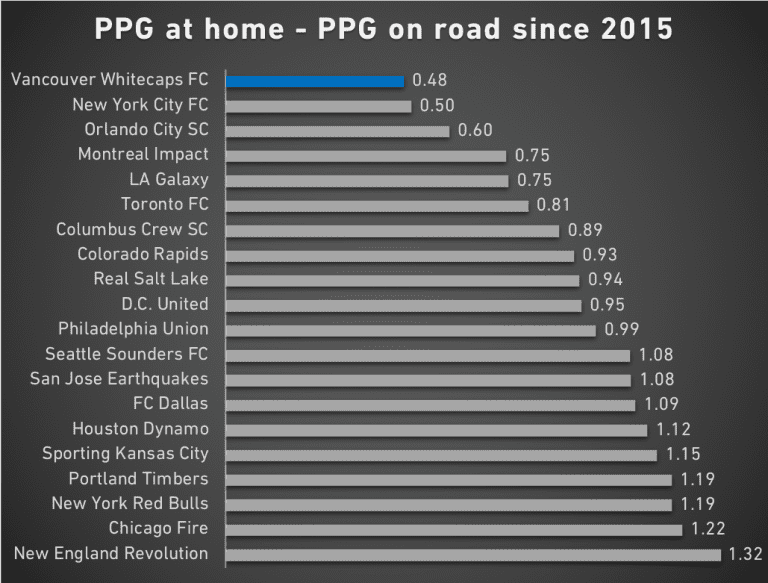There's been a lot of chatter on this website and on ExtraTime Radio about the Vancouver Whitecaps' less-than-pleasing style of play. And for good reason.
They finished last in MLS in possession percentage and passing accuracy in 2017 and have started 2018 at the bottom again in terms of possession and 16th in passing accuracy. That has not stopped them from getting the results they've needed in the regular season, finishing third in the West in 2017 and starting 2018 with 10 points through five matches.
The Whitecaps' success has been especially apparent when they have traveled away from BC Place. Since 2015, they have averaged 1.2 points per game, the third-best average among any team that has been in the league since then. Their start to the 2018 season on the road has been especially impressive, beating a Houston team who lost just once at BBVA Compass Stadium in 2017 and handing a hot Columbus team their first loss of the season.
Perhaps most noticeable is the difference between their home and road performances is minimal compared to other teams across the league. Vancouver have averaged just .48 ppg less on the road than they have at home since 2015.

Farhan Devji at WhitecapsFC.com did a great job a couple weeks ago breaking down why the 'Caps have been so successful on the road in recent years. His main points could be put more simply by saying that Vancouver have become experts at the bunker-and-counter style. Also, their depth has become essential as Vancouver has one of the more arduous travel schedules in the league.
Kendall Waston has matured into a leader along the backline and wins almost every ball in the air, while Stefan Marinovic has been solid since taking over for David Ousted (outside the rebound he gave up against Columbus last week).
Building off that base, head coach Carl Robinson and the front office leaned into that strategy in the offseason by acquiring a forward (Kei Kamara) who is more comfortable in transition than in possession and handing the keys on the wing to one of the most electric players in the league (Alphonso Davies). Brek Shea, once a rising star in MLS like Davies, has shown some flashes in this system, which allows him to use his speed and power rather than having him rely on decision-making in the final third. Even their nominal No. 10 (Yordy Reyna) fits right into the style, playing more like a second striker and pouncing on mistakes made by opponents.
The problem for the 'Caps is that this style works really well on the road, but hasn't translated to needed wins at home. Their 1.68 ppg at home since 2015 is third-worst among teams who have been in the league since 2015, and they failed to win either of their home playoff matches. They even have worse expected goals against average at home (1.66) than they do on the road (1.54). They're the only team in MLS that can claim that.
The balancing act between Vancouver's home and road form is one that Robinson has no doubt thought of. For now, being the top road team in MLS should be a claim that the Whitecaps embrace.













